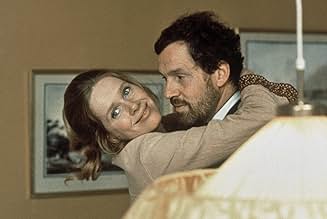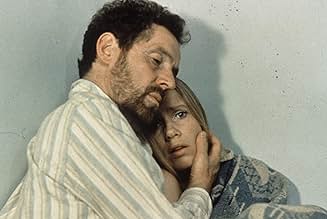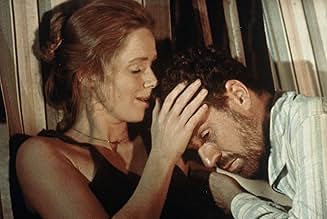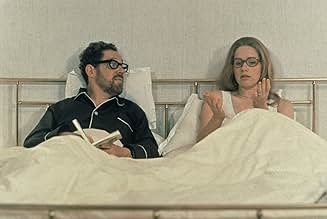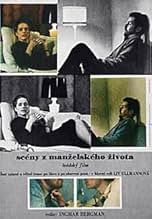IMDb RATING
8.5/10
18K
YOUR RATING
Ten years within the marriage of Marianne and Johan.Ten years within the marriage of Marianne and Johan.Ten years within the marriage of Marianne and Johan.
- Awards
- 3 wins total
Browse episodes
Featured reviews
"Scenes From A Marriage" is quite simply that: we meet Marianne & Johan ten years into their union & we witness half a dozen scenes of their lives. I'm not married, but I have of course known many people, family & friends, who were married & who talked, acted, & lived much like this couple does. That they are well-educated & affluent is somewhat irrelevant - married couples often seem to be keeping a certain secret (some keep it better than others) that they disguise with contentment, ritual, obligation, affection. Most of the time they keep this secret even from themselves. This movie is about the gradual discovery of the two main characters of the nature & ramifications of that secret.
As far as Bergman films go, it's strangely pretty, in color, with two attractive leads. But I think perhaps Bergman (& Sven Nykvist) sought to give us a sense of familiarity with the suburban, middle-class surroundings to lure us into a false sense of the security of the marriage in question. Without giving anything away, I suggest that this film is no less dark & heavy than other Bergman films; it rather goes for the heart in the way that you often wish modern dramas about relationships would. It's not trite, nor contrived, nor easily resolved. It's wise as life.
The movie was edited down by Bergman from a six-episode television series, which comprise the "scenes." The cast is great, but it's Ullmann & Josephson's show, & Ullmann is such a magnificent actor that I marvel at her expressive face, which Bergman smartly keeps his camera on.
It's unbearably wise, & sometimes difficult, but there aren't many films out there as honest as this one.
As far as Bergman films go, it's strangely pretty, in color, with two attractive leads. But I think perhaps Bergman (& Sven Nykvist) sought to give us a sense of familiarity with the suburban, middle-class surroundings to lure us into a false sense of the security of the marriage in question. Without giving anything away, I suggest that this film is no less dark & heavy than other Bergman films; it rather goes for the heart in the way that you often wish modern dramas about relationships would. It's not trite, nor contrived, nor easily resolved. It's wise as life.
The movie was edited down by Bergman from a six-episode television series, which comprise the "scenes." The cast is great, but it's Ullmann & Josephson's show, & Ullmann is such a magnificent actor that I marvel at her expressive face, which Bergman smartly keeps his camera on.
It's unbearably wise, & sometimes difficult, but there aren't many films out there as honest as this one.
There are few other films that have the direct authenticity of this one. It is very frank, honest, tender, and heartbreaking. The performances of the two primary actors are amazing. Never once did I doubt their sincerity. In every single scene they overwhelmingly conveyed the intense and nuanced emotions of the couple. I use the word "overwhelmingly" because that is exactly what it is. At times it is hard to watch. Especially the scene in which Johan admits his infidelity. I could feel Marainne's hurt/anger/confusion. There are moments of intense tenderness, as in the last scene where Johan comforts Marianne after her nightmare. To be sure, the actors had some incredible material with which to work. Bergman knows human nature as much as any of modern writer. His dialog is poetic at times, and achingly authentic at others. They way the couple eviscerates and dissects each other is alarmingly, yet honest. Rarely is a character saying what they actually feel. Rarely do the characters know what they feel. They, like many people, really are "emotional illiterates." Bergman's direction is minimal, and that is what makes it so effective. The emphasis is completely on the characters and their existences. This is a powerful, evocative film. And I have seen only the theatrical version. I can imagine the full TV version is even more detailed.
Scenes from a Marriage (the TV version, even as the theatrical cut is still very good and worth the time if the only copy available) is an intimate, naturalistic portrait of a couple, who at first are seemingly happy, then aren't, then try and find out where they go wrong. It's involving drama at its nexus, and for those who love the theater it's an absolute must see (aside from the theme, no music, all talk). Johan and Marianne are two of Bergman's most interesting, true characters (among his countless others) that he's ever presented, and like many other film artists, you can tell he's lived through at least some if not most of the emotions and trials these characters have been through.
Along with several supporting characters, two of the more notable ones played by Bibi Andersson and Malmjso are a perfect contrast in the first episode of the series. The conflicts that are established throughout the series never pay-off in a mis-fire. Craft-wise there is almost no style except for the minimal lighting by the great Sven Nykvist. And the dialog that goes on between the two leads goes from amusing to tragic, from romantic to bleak, and with all the emotions that I (as one who's never been married) can only guess can be as so. Bergman's script would be just that, a poignant, very profound lot of bits between two people more or less on paper, if not for Liv Ullmann and Erland Josephson. They turn on the emotions intuitively, like they've been these people somewhere else at some other time. Or rather, the husband and wife don't have very complicated jobs or economic situation, but the problems lie on the emotional plane, and the intellect they try to put to it. Johan loves another woman, how does that affect Marianne? Marianne asks for a divorce, how does that affect Johan? What will they do to cope? These are questions Bergman poses for his actors, among plenty of others, and they pull off the emotional cues off of each other like the most wonderful theatrical pros.
It's hard to find anything wrong with their acting, cause they don't over-do it (unless you're not into Marianne's changes in feeling in some scenes, which could be understandable), and the bottom line is that despite it being in Europe thirty years ago, it's highly possible these people could be in your house, or in your neighbor's house. Ullmann's Marianne is the 180 of her character from Persona, who could only let out emotions once or twice, mostly as an observer. Josephson's Johan is complex behind is usually sarcastic and simple demeanor- what drives him to do what he does in episode three, or in four? What will the conclusion lead to? Bergman creates a drama that is never boring, never diluted, and asks us to search for ideas about love and relationships we sometimes try and push away. It's a superb, concise treatise about the nature of falling in and out of love, how to differentiate what love is, and essentially what a marriage is. I can't wait to see the sequel, Saraband, which is Bergman's (definite) last film.
Along with several supporting characters, two of the more notable ones played by Bibi Andersson and Malmjso are a perfect contrast in the first episode of the series. The conflicts that are established throughout the series never pay-off in a mis-fire. Craft-wise there is almost no style except for the minimal lighting by the great Sven Nykvist. And the dialog that goes on between the two leads goes from amusing to tragic, from romantic to bleak, and with all the emotions that I (as one who's never been married) can only guess can be as so. Bergman's script would be just that, a poignant, very profound lot of bits between two people more or less on paper, if not for Liv Ullmann and Erland Josephson. They turn on the emotions intuitively, like they've been these people somewhere else at some other time. Or rather, the husband and wife don't have very complicated jobs or economic situation, but the problems lie on the emotional plane, and the intellect they try to put to it. Johan loves another woman, how does that affect Marianne? Marianne asks for a divorce, how does that affect Johan? What will they do to cope? These are questions Bergman poses for his actors, among plenty of others, and they pull off the emotional cues off of each other like the most wonderful theatrical pros.
It's hard to find anything wrong with their acting, cause they don't over-do it (unless you're not into Marianne's changes in feeling in some scenes, which could be understandable), and the bottom line is that despite it being in Europe thirty years ago, it's highly possible these people could be in your house, or in your neighbor's house. Ullmann's Marianne is the 180 of her character from Persona, who could only let out emotions once or twice, mostly as an observer. Josephson's Johan is complex behind is usually sarcastic and simple demeanor- what drives him to do what he does in episode three, or in four? What will the conclusion lead to? Bergman creates a drama that is never boring, never diluted, and asks us to search for ideas about love and relationships we sometimes try and push away. It's a superb, concise treatise about the nature of falling in and out of love, how to differentiate what love is, and essentially what a marriage is. I can't wait to see the sequel, Saraband, which is Bergman's (definite) last film.
Enormous success it had with audiences of Swedish TV, where it was shown in six episodes paved way for its theatrical release. This however called for compromising almost half the original length of celluloid.
As one of more easily understandable Bergman films, "Scenes From A Marriage" met much enthusiasm on both sides of the Atlatic.
The film showcases great two of Ingmar Bergman's favorite actors. Both Liv Ullman and Erland Josephson give lively mature performances, lauded by critics.
Being a down-to-earth family drama with strong social commentary of great relevance, "Scenes From A Marriage" has something important to convey. It is a meaningful picture.
It reflects on the nature of relationship between man and woman. It invites us to ponder on this basic issue, a cornerstone of human society Although not quite in the same league with bona-fide Bergman classics like "The Seventh Seal" and "Persona", "Scenes From A Marriage" remains a powerful movie.
As one of more easily understandable Bergman films, "Scenes From A Marriage" met much enthusiasm on both sides of the Atlatic.
The film showcases great two of Ingmar Bergman's favorite actors. Both Liv Ullman and Erland Josephson give lively mature performances, lauded by critics.
Being a down-to-earth family drama with strong social commentary of great relevance, "Scenes From A Marriage" has something important to convey. It is a meaningful picture.
It reflects on the nature of relationship between man and woman. It invites us to ponder on this basic issue, a cornerstone of human society Although not quite in the same league with bona-fide Bergman classics like "The Seventh Seal" and "Persona", "Scenes From A Marriage" remains a powerful movie.
The lawyer Marianne (Liv Ullmann) and the professor Johan (Erland Josephson) have been married for ten years, having two daughters. One night, Johan tells Marianne that he met a young woman, Paula, and he will travel to Paris with her for eight months. Caught by surprise, the perfect world of Marianne falls apart, and she starts living alone. Along the next ten years, they meet each other in different situations, in a relation of love and hate for each other. The first time I watched this theatrical movie I was single and was less than twenty years old. In that occasion, I loved the performances of Liv Ullmann and Erland Josephson, but I found the story too long. Today, with twenty-five years of marriage, I have watched this film again on video: what a masterpiece! Ingmar Begman presents an amazingly credible and honest story of the relationship of a couple along twenty years of their lives. Liv Ullmann is so beautiful and has such a stunning performance that impressed me. Erland Josephson also has a magnificent performance as an insecure but sensitive man, full of contradictions and without knowing how to make a decision about his feelings. Unfortunately the VHS spoken in Swedish distributed by Concorde in Brazil has many dialogs without subtitles. Sometimes, four, five sentences are omitted in the translation, or a long speech of a character is resumed to a five or six words sentence. A crime against the viewer! Highly recommended for married couples as a lesson of life. My vote is ten.
Title (Brazil): `Cenas de um Casamento' (`Scenes From a Marriage')
Title (Brazil): `Cenas de um Casamento' (`Scenes From a Marriage')
Did you know
- TriviaAccording to an interview with Ingmar Bergman, after the TV mini-series was broadcast in Sweden, the divorce rate in Sweden increased substantially and the number of married couples who seek marriage counseling also doubled.
- Crazy creditsThe end credits aren't shown on-screen but read by director and writer Ingmar Bergman, while "a beautiful picture of Fårö" is shown (different for each episode). Bergman himself is not credited at all.
- Alternate versionsBergman prepared a four-hour version of "Scenes from a Marriage," hoping it would be shown as a two-part film. It never appeared in the US, although the original six-hour mini-series was shown on PBS after the 168 minute cut had played theatrically.
- ConnectionsEdited into Scenes from a Marriage (1974)
- SoundtracksConcerto for violin, strings & continuo in B flat major, Op. 10, No. 1
(uncredited)
Written by Tomaso Albinoni
A short extract is played during the very beginning and end of each episode (it's not featured in the theatrical version)
- How many seasons does Scenes from a Marriage have?Powered by Alexa
Details
- Release date
- Country of origin
- Official site
- Language
- Also known as
- Szenen einer Ehe
- Filming locations
- Production company
- See more company credits at IMDbPro
- Runtime
- 50m
- Sound mix
- Aspect ratio
- 4:3
Contribute to this page
Suggest an edit or add missing content

